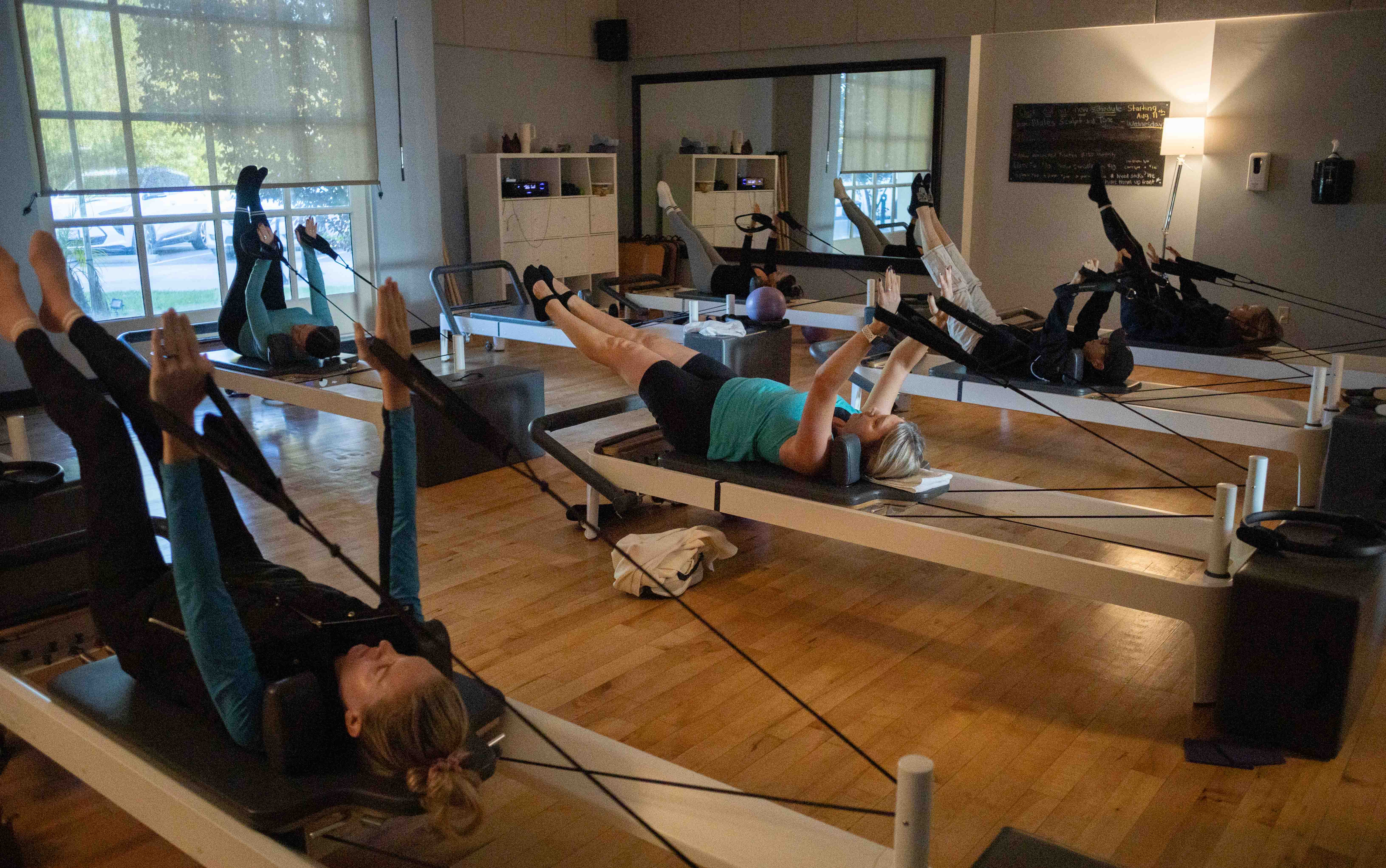6 Reasons Why Pilates Benefits Your Mental Health
November 12th, 2025 | 3 min. read

Everyone struggles with stress; it is simply ubiquitous. The causes often feel never-ending and multitudinous.
- Work
- Safety
- Health
- Family
- Housing
- Finances
- Self-esteem
- Social isolation
Stress causes feelings of overwhelm, depression, and fatigue. It can also disrupt sleep, increase or decrease hunger, and even cause body pains.
More and more people are learning steps to reduce stress and tend to their mental health. We now know we can’t keep our worries bottled up and need to make time to take care of ourselves — through rest, quality time with friends, and movement.
Everyone knows Pilates is good for strength, mobility, balance, and flexibility, but did you know it can significantly improve your mental health? In this article, we are going to look at Pilates’ impact on psychological well-being and how and why it works.
 How does Pilates improve mental health?
How does Pilates improve mental health?
Pilates is a form of movement developed to help soldiers, dancers, and later athletes recover from injuries. In the last 30 to 40 years, it has become a fitness trend among the general population. Pilates is a form of exercise, rehabilitation, and moving meditation all rolled into one.
1. Exercise
Pilates is a form of exercise. Researchers have discovered that when you exercise, your brain chemistry changes. Stress hormones, including cortisol and adrenaline, drop, and the “feel-good” hormones endorphins, dopamine, and serotonin are released. The effect is that people experience a better mood, less anxiety, and reduced feelings of pain.
 2. Breath
2. Breath
A primary focus of Pilates is controlled breathing. The Pilates form of breathing emphasizes breathing into the ribs and posterior body while keeping the core engaged. Breath is used in harmony with each gesture, helping you move from your torso slowly and with control.
Deep breathing compresses the vasovagal nerve, which runs from the base of the brain through the center of the body and to our organs. According to the Yale School of Medicine, the stimulation of the nerve unlocks a relaxation response, aiding in digestion, regulating blood pressure and heart rate, and enhancing a sense of calm.
3. Community
Most people who practice Pilates attend classes with a trained instructor. Reformer classes tend to be small with only five to eight students. Small group classes help facilitate a warm and team-like environment that fosters accountability and camaraderie.
This sense of belonging helps mitigate feelings of loneliness and isolation and bolsters a sense of well-being.
 4. Pain Reduction
4. Pain Reduction
Pilates is effective at reducing pain, including low back pain (as shown in this study) and neck and joint pain due to musculoskeletal conditions (such as osteoarthritis). Pain and depression, and/or anxiety are often interlinked. Reducing chronic pain (or even intermittent pain) has a notable improvement in mood.
5. Improved Sleep
A good night’s rest can make a world of difference in a person’s outlook and experience of the day. People with mental health issues often struggle with fatigue and sleep disorders, and fatigue and sleep deprivation can exacerbate mental health issues. Harvard calls this bidirectional.
When you struggle with your mental health, it is essential to implement good practices that support adequate, quality rest. Pilates is proven to improve the quality of sleep and duration, and lessen fatigue.
6. Improved Cognitive Function
Pilates is a form of mind-body exercise, similar to yoga. The term mind-body means a type of movement that emphasizes breath and mental focus.
By practicing Pilates, you teach your mind to be present, reducing the "fight or flight" response. When you experience this feeling of calm, you help to rewire your brain away from chronic negative inputs and toward a more optimistic outlook. This process is called neuroplasticity and is instrumental in improving mental health.
 Self-care through Pilates
Self-care through Pilates
External stressors are real.
To combat these challenges, everyone must practice some form of self-care, whether they are dealing with common day-to-day obstacles or complex mental health struggles.
Pilates is not just a fad. It is an essential tool to be fitter, more limber, and well in mind, body, and spirit — all key features to a self-care routine. It is also a practice for everybody, regardless of age, size, gender, or ability.
If you are new to Pilates, look for an intro or beginners class in your neighborhood. If you are in the Santa Clarita area, come to The Paseo Club and check out our Pilates studio. There are several classes available every day for all levels.
Pilates is only one of dozens of choices at The Paseo Club. Discover tennis and pickleball, swimming, fitness, cardio, yoga, and more. Schedule a tour and visit all eight acres of the club, and see what areas interest you.
If you are ready to live your best life, join The Paseo Club today and start living the Paseo Lifestyle. We can’t wait to see you!
Topics:

